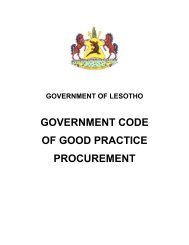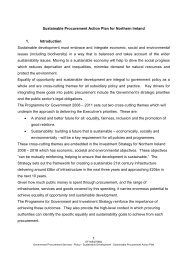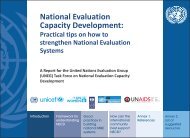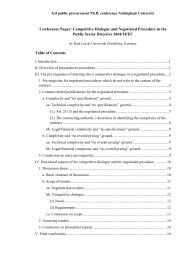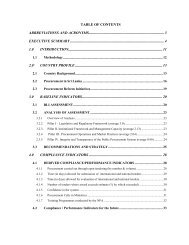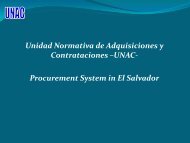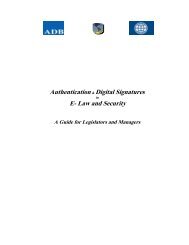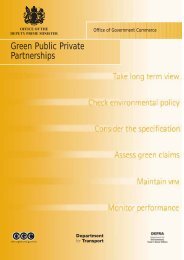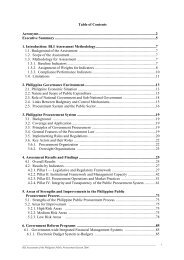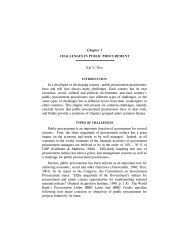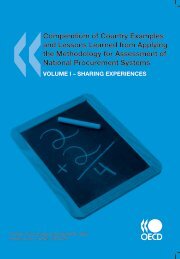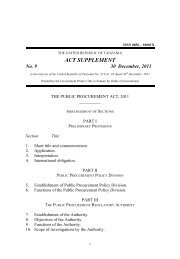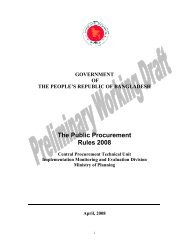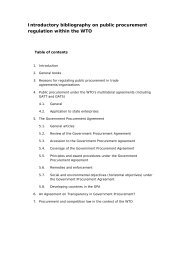Informality, Corruption and Public Procurement in the ... - unpcdc
Informality, Corruption and Public Procurement in the ... - unpcdc
Informality, Corruption and Public Procurement in the ... - unpcdc
Create successful ePaper yourself
Turn your PDF publications into a flip-book with our unique Google optimized e-Paper software.
only illegal but also corrupt. Respondents were <strong>the</strong>refore asked whe<strong>the</strong>r <strong>the</strong>y thought various sectorsof society – <strong>in</strong>clud<strong>in</strong>g public procurement – were corrupt. Respondents <strong>in</strong> all countries were conv<strong>in</strong>cedthat due to <strong>the</strong> extensive use of contacts <strong>and</strong> <strong>in</strong>formal networks…corruption <strong>in</strong> public procurement iswidespread. Respondents <strong>in</strong> <strong>the</strong> Czech Republic, Slovenia <strong>and</strong> Romania spoke about corruption <strong>in</strong>public procurement <strong>in</strong> more general terms. Bulgarian respondents on <strong>the</strong> o<strong>the</strong>r h<strong>and</strong>, <strong>in</strong>dicated that <strong>the</strong>use of kickbacks is commonly used <strong>in</strong> <strong>the</strong>ir country: “as for <strong>the</strong> public procurement system, my feel<strong>in</strong>gis that it has been established to promote corruption. There is a zero chance of success if you take part<strong>in</strong> a public procurement tender <strong>in</strong> <strong>the</strong> normal way <strong>and</strong> you have no access to <strong>the</strong> person who is <strong>in</strong>charge of th<strong>in</strong>gs. And if you are ready to take up th<strong>in</strong>gs <strong>in</strong> an irregular manner (you have to) promisesometh<strong>in</strong>g <strong>in</strong> exchange for <strong>the</strong> favour…” (Nb-7-Bu); “so much public procurement means paymentunderneath <strong>the</strong> counter <strong>and</strong> br<strong>in</strong>gs a price hike, which is to <strong>the</strong> advantage of a certa<strong>in</strong> group ofpeople...10 per cent – most often it is (even) more… – is a common practice <strong>in</strong> most companies…”(Ib-5-Bu).None of <strong>the</strong> respondents said <strong>the</strong>ir companies had won tender procedures by mak<strong>in</strong>g use ofcontacts <strong>and</strong> <strong>in</strong>formal networks or by offer<strong>in</strong>g or pay<strong>in</strong>g bribes to public procurement officials. Nordid any of <strong>the</strong>m admit that <strong>the</strong>ir companies had colluded with o<strong>the</strong>r companies to w<strong>in</strong> public tenders.They did, however, talk about how <strong>the</strong>ir companies had failed to w<strong>in</strong> public tenders – some because<strong>the</strong>y refused to pay kickbacks: “…he rem<strong>in</strong>ds me he is <strong>in</strong>fluential…for example he says he has a goodcontact at <strong>the</strong> m<strong>in</strong>istry where we apply for public procurement <strong>and</strong> if we give some money to hisfoundation, he helps us to get this public procurement through his contact. I can say he was notsuccessful.” [<strong>in</strong> brib<strong>in</strong>g <strong>the</strong> speaker] (Ib-9-CR); “<strong>the</strong>re was (a) huge public tender for a design project<strong>and</strong> <strong>the</strong>n I was asked to pay DEM 5 000, <strong>in</strong> order to w<strong>in</strong> <strong>the</strong> tender (a DEM 80,000 contract). So Iasked if I had to give <strong>the</strong> money to <strong>the</strong> committee <strong>in</strong> charge of consider<strong>in</strong>g <strong>the</strong> offers. They told me Ihad to give <strong>the</strong> money to a deputy m<strong>in</strong>ister. I refused to give <strong>the</strong> money to a person who was not <strong>in</strong> <strong>the</strong>committee, who was ‘only’ <strong>in</strong>fluenc<strong>in</strong>g <strong>the</strong> committee…so I didn’t pay <strong>the</strong> money, filed a bid, but didnot w<strong>in</strong> <strong>the</strong> tender.” (Nb-8-Bu).O<strong>the</strong>rs failed to w<strong>in</strong> because compet<strong>in</strong>g companies had already secured <strong>the</strong> outcome of <strong>the</strong>tender: “…public procurement is organised <strong>in</strong> such a way as to prevent mega corporations fromw<strong>in</strong>n<strong>in</strong>g <strong>the</strong> procurement. Informal activities are evident <strong>in</strong> arrang<strong>in</strong>g <strong>the</strong> criteria <strong>in</strong> such a way as tore-confirm known local companies, which have won <strong>the</strong> order before, <strong>in</strong> <strong>the</strong> many rout<strong>in</strong>e actionswhich put participants hav<strong>in</strong>g long-term contacts…at an advantage to o<strong>the</strong>r bidders. For example <strong>in</strong> arecent public tender for some production equipment <strong>the</strong> tender requirements were set <strong>in</strong> such a way(quality of <strong>the</strong> equipment was not so essential <strong>in</strong> <strong>the</strong> evaluation of offers) as to tip <strong>the</strong> scales <strong>in</strong> favour6
Some offered someth<strong>in</strong>g <strong>in</strong> return for comply<strong>in</strong>g with <strong>the</strong>ir requests, while o<strong>the</strong>rs resorted tothreats: “<strong>the</strong>y usually use a bribe…at most a bottle of good distillate, for example whisky or br<strong>and</strong>y.”(Pr-6-CR); “I have even refused a request which was supported by a bribe, for example CZK 20 000…” (Pr-9-CR); “people who have no connections use corruption…<strong>the</strong>y offer directly or <strong>the</strong>y say what<strong>the</strong>y could do for you. They like to help politicians dur<strong>in</strong>g elections.” (Pr-3-Sl); “(some people) try to<strong>in</strong>fluence me not only by plead<strong>in</strong>g with me, but also by suggest<strong>in</strong>g that <strong>the</strong>y would make it up to mesomehow…” (Pr-2-Bu); “yes, <strong>the</strong>re have been threats <strong>and</strong> offers of favours <strong>in</strong> return <strong>and</strong> evenproposals of money…” (Pr-8-Bu).Table 5: Attempts at <strong>in</strong>fluenc<strong>in</strong>g <strong>the</strong> respondent when mak<strong>in</strong>g requestsCzR%Slov%Bulg%Rom%Attempt made to <strong>in</strong>fluence <strong>the</strong> respondent 89 88 59 100No attempt made to <strong>in</strong>fluence <strong>the</strong> respondent 6 6 15 ---O<strong>the</strong>r/Don’t know 6 6 26 ---N= (18) (17) (27) (9)Note: N = <strong>the</strong> total number of text units. Each text unit represents an answer to a questiongiven by one respondent.When answer<strong>in</strong>g questions about <strong>the</strong> k<strong>in</strong>d of requests <strong>the</strong>y had received <strong>and</strong> also whe<strong>the</strong>r <strong>the</strong>people request<strong>in</strong>g <strong>the</strong>ir assistance tried to <strong>in</strong>fluence <strong>the</strong>m <strong>in</strong> one way or ano<strong>the</strong>r, most respondents didnot dist<strong>in</strong>guish between requests received by people more generally, or by contacts <strong>and</strong> <strong>in</strong>formalnetworks as such. As we are particularly <strong>in</strong>terested <strong>in</strong> <strong>in</strong>formal networks, we asked <strong>the</strong> respondentswhe<strong>the</strong>r <strong>the</strong>y had been <strong>in</strong> contact with <strong>in</strong>formal networks <strong>in</strong> <strong>the</strong>ir work. A majority of <strong>the</strong> respondents<strong>in</strong> all countries answered <strong>in</strong> <strong>the</strong> affirmative. Some of <strong>the</strong>m spoke about <strong>in</strong>formal networks <strong>in</strong> fairlygeneral terms, whereas o<strong>the</strong>rs were more specific, referr<strong>in</strong>g to particular types of <strong>in</strong>formal networks.We were <strong>in</strong>terested to know whe<strong>the</strong>r requests made by <strong>in</strong>formal networks differed from requestsmade by o<strong>the</strong>rs. Most respondents <strong>in</strong> Slovenia <strong>and</strong> Bulgaria as well as well as quite a few <strong>in</strong> <strong>the</strong> CzechRepublic thought requests made by <strong>in</strong>formal networks were different <strong>and</strong> <strong>the</strong>y gave several examples.Requests made by <strong>in</strong>formal networks as a rule tend to be more extensive than those made by peoplenot belong<strong>in</strong>g to or affiliated with <strong>in</strong>formal networks – though <strong>the</strong> latter are not always very clearlyformulated: “<strong>the</strong>ir requests are more extensive…” (Pr-10-CR); “<strong>the</strong> bus<strong>in</strong>ess effect from <strong>the</strong> request ismore hidden” (Pr-10-CR); “<strong>the</strong>y are talk<strong>in</strong>g between <strong>the</strong> l<strong>in</strong>es.” (Pr-5-Sl).12
<strong>in</strong> an illegitimate manner <strong>in</strong> <strong>the</strong>ir country, though <strong>the</strong>ir stories were not as bad as those told by <strong>the</strong>Bulgarian respondents.Our assumptions may, of course, be wrong, though o<strong>the</strong>r explanations seem more plausible. TheRomanian respondents did come across as ra<strong>the</strong>r cautious compared to respondents <strong>in</strong> <strong>the</strong> CzechRepublic, Slovenia <strong>and</strong> Bulgaria. It is also worth not<strong>in</strong>g that <strong>the</strong> refusal rate for <strong>in</strong>terviews <strong>in</strong> Romaniawas considerably higher than <strong>in</strong> <strong>the</strong> o<strong>the</strong>r countries, at roughly 40%. An extensive anti-corruptioncampaign was tak<strong>in</strong>g place <strong>in</strong> Romania at <strong>the</strong> time of <strong>in</strong>terview<strong>in</strong>g <strong>and</strong> may have made respondentsmore reluctant to talk about <strong>the</strong> use of <strong>in</strong>formal relations <strong>in</strong> public procurement for fear of expos<strong>in</strong>g<strong>the</strong>mselves – despite repeated assurances that <strong>the</strong>ir answers to our questions would not be disclosed toa third party. This, <strong>in</strong> turn, may expla<strong>in</strong> why f<strong>in</strong>d<strong>in</strong>gs from Romania only partially confirm ourassumptions.The relatively limited number of <strong>in</strong>-depth <strong>in</strong>terviews conducted may of course also havecontributed to differences between countries that were not expected. For this reason, we cannot claimthat our f<strong>in</strong>d<strong>in</strong>gs are representative of <strong>the</strong> views <strong>and</strong> experiences of bus<strong>in</strong>ess representatives <strong>and</strong>procurement officials as such. However, samples have been designed <strong>in</strong> such a way that <strong>the</strong>re is noreason to believe that <strong>the</strong>y are not. 9 In any case, our f<strong>in</strong>d<strong>in</strong>gs are valid as <strong>the</strong> views <strong>and</strong> experiences of120 people engaged <strong>in</strong> public procurement <strong>in</strong> East Central <strong>and</strong> South East Europe. Their experiences<strong>in</strong>dicate that <strong>in</strong>formal practices are common <strong>in</strong> public procurement <strong>and</strong> that <strong>the</strong>y are often used todistort <strong>the</strong> outcome of public tenders. It thus seems reasonable to conclude that efforts to improvetransparency <strong>and</strong> reduce <strong>the</strong> scope of corrupt practices <strong>in</strong> public procurement must address not only<strong>the</strong> laws <strong>and</strong> rules regulat<strong>in</strong>g <strong>the</strong> tender procedures, but also <strong>the</strong> “culture of <strong>in</strong>formality” <strong>in</strong> order to besuccessful.9 Larger national quota-based surveys due <strong>in</strong> 2005 will generate more representative data <strong>and</strong>hopefully also confirm at least some of <strong>the</strong> f<strong>in</strong>d<strong>in</strong>gs from <strong>the</strong>se <strong>in</strong>-depth <strong>in</strong>terviews.15



